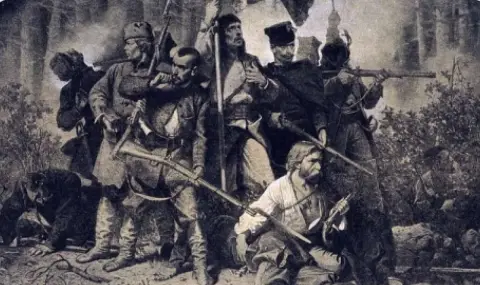On November 29, the Polish Uprising breaks out. Began as a local rebellion against the Russian governor in Warsaw on November 29, 1830.
Because of the date it broke out, the uprising is also called “November“.
The Poles were encouraged by the events of July 1830, when the French expelled the last Bourbon king who tried to trample on their constitution. The events in Paris also raised fears that Nicholas I would abrogate the Polish constitution. Fears intensified in November when authorities in Poland ordered a partial mobilization amid rumors that the tsar would send Polish troops to quell the French Revolution. The mobilization order incites a group of patriots led by Lieutenant Piotr Wysocki to action.
On the night of November 29-30, they took up arms with the cadets from the Warsaw Infantry School and attacked the Russian garrison and the “Belvedere“ palace, where Grand Duke Konstantin Pavlovich resided. Both attacks failed, but signaled a mass uprising by the inhabitants of the Polish capital. The rebels seize the arsenal and control the city. On December 3, a “Provisional Government” was formed, replaced only two days later by the dictatorship of General Józef Chlopicki.
At the beginning of the following year, it grew into a full-scale war, after the Polish parliament - the Sejm - declared the Russian Tsar Nicholas I deposed from the Polish throne. At the beginning of the hostilities, the insurgents won a number of successes, but the social and political disagreements between them helped the tsarist army to win a complete victory in October 1831.
The result was severe for the Poles in the Kingdom: the liberal constitution of 1815 was repealed, and with it a number of sovereign Polish institutions (the parliament, the army, the University of Warsaw) were abolished. In their place, an authoritarian regime headed by the Tsar's deputy Ivan Paskevich was established. In the subsequent “Great Emigration” thousands of Poles, including many representatives of the nation's intellectual and creative elite, emigrated to Western Europe.
History of the Great Emigration begins already during the November Uprising. From July to October 1831 some groups of the Polish troops, pressed by the Russian troops, cross the borders with Prussia and Austria and lay down arms there. Before the final suppression of the uprising in the autumn of 1831, the main rebel forces and the representatives of the government and the Diet fled abroad. By October 1831, about 50 thousand Poles were outside the borders of the Kingdom of Poland - on the territory of Prussia – about 30 thousand, in Austria – about 20 thousand.
When on November 1, 1831 Emperor Nicholas I announced an amnesty for the participants in the uprising, many rebels who believed these promises and motivated by longing for home returned to their country. Some of them were immediately sent into exile in Siberia or the Caucasus. Acting in coordination with Russia, Prussia and Austria forced the rebels to return home by threats and even force during the reign of Emperor Nicholas I. As a result, at the end of 1831 a total of about 3,000 rebels remained in Prussia and Austria. The rest either returned to Russia or independently moved to the West.
